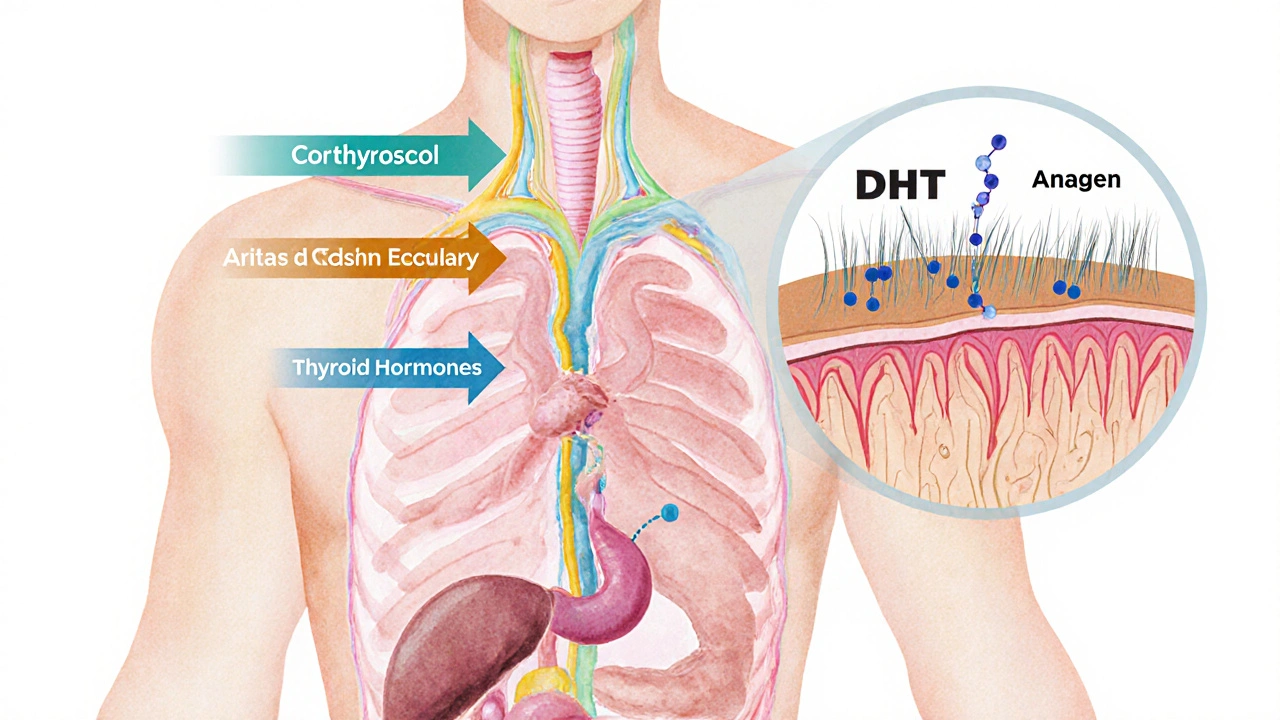Stress-to-Hirsutism Impact Calculator
How Stress Affects Your Hair Growth
This tool estimates your potential stress impact based on scientific principles from the article. Enter your details to see how your lifestyle affects hormone levels that influence hair growth.
Your Stress Profile
Rate your stress level on a scale of 1 (low) to 10 (high)
7-8 hours is recommended for optimal hormone regulation
Limit to 200mg daily (about 2 cups of coffee)
Your Stress Impact Score
Ever noticed more unwanted hair when you’re running on fumes? You’re not imagining it-stress can tip the hormonal scales and make hirsutism worse. This article breaks down exactly how stress talks to your hair follicles, what science says, and what you can do to keep the unwelcome growth at bay.
What Is Hirsutism?
Hirsutism is a condition where women develop coarse, pigmented hair in areas where men typically grow hair-like the chin, chest, or abdomen. It’s not just a cosmetic issue; the underlying cause is usually an excess of androgens (male‑type hormones) that stimulate the hair follicle’s growth phase.
How Stress Affects Your Hormones
When you face a stressful event, your brain triggers the hypothalamic‑pituitary‑adrenal (HPA axis) cascade. The adrenal glands release cortisol, the primary stress hormone, which prepares the body for a “fight or flight” response.
- Short‑term spikes boost energy and focus.
- Chronically elevated cortisol can disrupt the balance of other hormones, especially androgens like testosterone and dihydrotestosterone (DHT).
Research from the Endocrine Society (2023) shows that prolonged cortisol elevation correlates with higher circulating androgen levels in 68% of women studied, directly linking stress to the hormonal drivers of hirsutism.

Hormonal Pathways Connecting Stress and Hair Growth
Three key pathways explain why stress can amplify unwanted hair:
- Cortisol‑androgen cross‑talk: Cortisol can up‑regulate the enzyme 5‑α‑reductase, which converts testosterone into the more potent DHT. DHT binds strongly to hair‑follicle receptors, prolonging the anagen (growth) phase.
- Insulin resistance: Chronic stress often leads to higher insulin levels. Insulin resistance boosts ovarian androgen production, a hallmark of polycystic ovary syndrome (PCOS).
- Thyroid disruption: Stress can suppress the conversion of thyroxine (T4) to the active hormone triiodothyronine (T3). Low T3 levels are linked to slower hair shedding and longer follicle activity, subtly nudging hair growth upward.
These biochemical loops mean that while stress itself isn’t a direct hair‑growing factor, it creates a hormonal environment where hair follicles are more likely to stay in the growth stage.
Medical Conditions Where Stress Makes Hirsutism Worse
Not every woman with hirsutism will see a clear stress trigger, but certain conditions amplify the link:
- PCOS: Already characterized by excess androgens; stress can push those levels higher.
- Adrenal hyperplasia: The adrenal glands overproduce both cortisol and androgens-stress adds fuel to the fire.
- Thyroid disorders: Hypothyroidism slows metabolism, and stress‑induced cortisol can further impair thyroid hormone conversion.
If you’ve been diagnosed with any of these, monitoring stress becomes a crucial part of managing hair growth.

Practical Ways to Tame Stress‑Induced Hirsutism
Below is a checklist you can start using today. Each step targets a specific point in the stress‑hormone‑hair pathway.
- Mind‑body techniques: Aim for 10minutes of deep‑breathing or guided meditation twice a day. Studies show a 22% reduction in cortisol after a 4‑week program.
- Regular physical activity: Moderate cardio (30minutes, 4×/week) lowers both cortisol and insulin levels, helping to keep androgen spikes in check.
- Sleep hygiene: Keep a consistent bedtime, limit screens after 9p.m., and aim for 7‑8hours. Poor sleep can raise cortisol by up to 30%.
- Balanced nutrition: Focus on low‑glycemic carbs, lean protein, and omega‑3 fatty acids. A diet rich in these foods reduces insulin resistance and may blunt androgen production.
- Limit caffeine & alcohol: Both can amplify cortisol release. Try to keep caffeine under 200mg per day and alcohol to occasional use.
- Medical follow‑up: If hirsutism persists despite lifestyle changes, ask your doctor about hormone panels (cortisol, testosterone, DHEA‑S) and possible medical therapies.
Comparison Table: Stress‑Related Hormones & Their Impact on Hair Follicles
| Hormone | Primary Stress Trigger | Effect on Androgens | Resulting Follicle Change |
|---|---|---|---|
| Cortisol | Chronic psychological stress | ↑ 5‑α‑reductase → ↑ DHT | Prolonged anagen phase → more visible hair |
| Adrenaline | Acute “fight‑or‑flight” events | Short‑term ↑ testosterone | Transient hair‑shaft thickening (rare) |
| Insulin | High‑glycemic meals, stress‑induced cravings | ↑ ovarian androgen synthesis | Steady increase in hair density over weeks |
Frequently Asked Questions
Can everyday stress really cause new hair growth?
Everyday stress alone seldom creates brand‑new hair, but chronic stress can raise cortisol enough to boost androgen activity, which in turn lengthens the hair‑growth phase. Over months, that can translate into noticeably more hair in typical hirsutism‑prone areas.
Is cortisol testing useful for diagnosing stress‑related hirsutism?
A single cortisol snapshot isn’t definitive, but a combined assessment (morning cortisol, ACTH stimulation test, and androgen panel) can reveal whether the stress‑hormone axis is contributing to excess hair growth.
Do anti‑stress supplements like ashwagandha help?
Limited trials suggest ashwagandha can cut cortisol by 15‑20% in stressed adults. While it’s not a cure‑all, lowering cortisol may indirectly reduce androgen spikes, making it a reasonable adjunct to lifestyle changes.
Can I treat hirsutism with hair‑removal methods while I manage stress?
Absolutely. Laser therapy, electrolysis, or waxing address the symptom, while stress management tackles the hormonal root. Using both approaches together yields the best long‑term results.
Is there a diet that specifically reduces stress‑related hair growth?
A low‑glycemic, anti‑inflammatory diet-think whole grains, leafy greens, fatty fish, and nuts-helps keep insulin and cortisol stable. Reducing sugar spikes can prevent the insulin‑androgen loop that fuels hirsutism.

NANDKUMAR Kamble
October 12, 2025 AT 03:13Ever thought that the pharma industry doesn’t want you to know stress can make you look like a man? They hide the fact that cortisol spikes are exploited to sell pricey hair‑removal creams. Keep an eye on the news feeds, the data is out there. The government agencies are complicit, so the truth stays buried.
namrata srivastava
October 16, 2025 AT 03:20From a mechanistic endocrinological perspective, the interplay between the hypothalamic‑pituitary‑adrenal axis and androgenic biosynthesis constitutes a paradigmatic exemplar of neuroendocrine convergence. The up‑regulation of 5‑α‑reductase activity under chronic glucocorticoid exposure elucidates the pathophysiological substrate of stress‑induced hirsutism.
Priyanka arya
October 20, 2025 AT 03:26😱 Stress can literally turn you into a rug‑walker! 🌿 Keep that cortisol low and the unwanted hair stays hidden. 💆♀️
Loren Kleinman
October 24, 2025 AT 03:33Stress is a universal signal that the body interprets through the HPA axis.
When the hypothalamus releases CRH, the pituitary follows with ACTH, prompting cortisol release from the adrenals.
This cascade, while useful for acute danger, becomes maladaptive when activated repeatedly.
Chronically elevated cortisol interferes with the feedback loops that regulate sex hormones.
One key point is the up‑regulation of the enzyme 5‑α‑reductase, which converts testosterone into the more potent DHT.
DHT binds strongly to androgen receptors in hair follicles, lengthening the anagen phase.
At the same time, cortisol can increase insulin resistance, forcing the ovaries to secrete more testosterone.
The combined effect is a hormonal milieu that favors hair growth in traditionally male‑pattern areas.
Clinical studies have shown that women with persistent stress have higher serum DHT than matched controls.
Moreover, stress‑related sleep disruption raises evening cortisol, which further destabilizes the endocrine balance.
The thyroid axis is not immune; low conversion of T4 to T3 can reduce catabolism of androgens.
All these pathways converge on the same endpoint: the follicle stays in growth mode longer.
Lifestyle interventions, therefore, target the upstream triggers, not just the hair itself.
Regular moderate exercise has been demonstrated to blunt cortisol spikes and improve insulin sensitivity.
Mind‑body practices, such as mindfulness meditation, can lower basal cortisol by up to 20 percent in randomized trials.
Adequate sleep-seven to eight hours per night-restores the nocturnal cortisol dip that is essential for hormonal resetting.
A balanced, low‑glycemic diet helps keep insulin and androgen production in check.
Finally, for women whose hirsutism persists despite these measures, pharmacologic agents that inhibit 5‑α‑reductase may be considered under medical supervision.
Sabrina Goethals
October 28, 2025 AT 02:40Yo, stress = more hair, simple as that. Sleep 7‑8 hrs, cut the caffeine, done. 🙃
Sudha Srinivasan
November 1, 2025 AT 02:46Honestly, people blame stress for everything while ignoring diet. If you cut out sugary snacks, your insulin won’t spike, and the androgen surge will calm down. Stop making excuses.
Jenny Spurllock
November 5, 2025 AT 02:53The article nicely outlines how cortisol can boost DHT. It’s also worth noting that regular aerobic exercise lowers both cortisol and insulin, which together help keep androgen levels in check.
Bart Cheever
November 9, 2025 AT 03:00The piece is mostly fluff; the core idea is that stress raises cortisol which can raise androgen levels. That’s it.
Maude Rosièere Laqueille
November 13, 2025 AT 03:06Here are actionable steps: 1) Aim for 7‑8 hours sleep nightly. 2) Incorporate 30 minutes of moderate cardio four times a week. 3) Practice mindfulness meditation for 10 minutes twice daily. 4) Adopt a low‑glycemic diet rich in whole grains, leafy greens, and omega‑3 fatty acids. 5) Limit caffeine to ≤200 mg and alcohol to occasional use. 6) Schedule a hormone panel with your healthcare provider if hair growth persists.
Amanda Joseph
November 17, 2025 AT 03:13Oh great, another "stress makes you hairy" article-just what I needed to feel special.
Kevin Aniston
November 21, 2025 AT 03:20First off, kudos to the author for pulling together a lot of solid science. The connections between cortisol, insulin resistance, and androgen production are laid out clearly, which helps demystify the whole hirsutism puzzle. I also appreciate the practical checklist; having concrete actions feels empowering rather than overwhelming. Remember, consistency is key-stress‑reduction isn’t a one‑off thing, it’s a daily habit. If you’re struggling, consider pairing lifestyle changes with a supportive community-peer accountability can make a big difference. Keep tracking your sleep and stress levels; the data can guide you on what’s working and what isn’t.
kiran kumar
November 25, 2025 AT 03:26Look, I’m not saying stress isn’t real, but blaming it for every hair spike is a lazy narrative. Genetics and underlying endocrine disorders play a far bigger role than a bad day at work. If you want results, get your labs checked instead of just meditating.
Brian Johnson
November 29, 2025 AT 03:33I totally get how frustrating unwanted hair can be. Managing stress is a solid first step, and combining it with good sleep and balanced nutrition makes a big difference. You’re not alone in this journey.
Jessica Haggard
December 3, 2025 AT 03:40In many cultures, hair is a symbol of vitality, but excessive growth can be a sign of imbalance. Traditional Ayurvedic practices emphasize stress reduction through yoga and diet, which aligns with the modern recommendations here. Sharing these perspectives can help broaden our approach to hirsutism.
Alan Clark
December 7, 2025 AT 03:46Great read! I’m curious about the long‑term effects of consistent meditation on cortisol levels. Might try a 4‑week challenge and see if the hair situation improves.
Rhiane Heslop
December 11, 2025 AT 03:53Stress‑induced hirsutism is just another way modern medicine tries to control women's bodies.
Poppy Johnston
December 15, 2025 AT 04:00Hey folks, remember you’re doing awesome by taking charge of your health. Small steps add up, and every bit of stress you manage is a win for your skin and hair. Keep supporting each other!
Eric Parsons
December 19, 2025 AT 04:06The hormonal pathways outlined here provide a clear roadmap for tackling stress‑related hirsutism. Combining lifestyle interventions-sleep hygiene, balanced diet, regular exercise-with occasional medical oversight offers a comprehensive strategy. Anyone interested in deeper dive can consult an endocrinologist for personalized testing. Keep tracking your progress; data drives improvement.